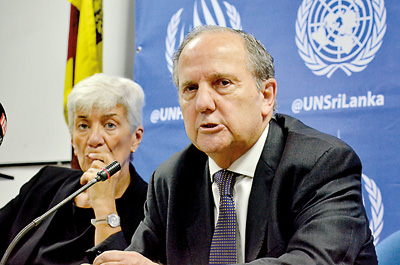News
Torture still continues: UN rapporteurs slam CID, TID
Two United Nations Special Rapporteurs yesterday accused the Criminal Investigations Department (CID) and the Terrorism Investigation Divisions (TID) of using torture as a “common practice” in their probes.
Juan E. Mendez, the Rapporteur on torture and other cruel, inhuman and degrading treatment or punishment and Monica Pinto, Rapporteur on the independence of judges and lawyers, told a news conference at the end of a ten-day visit that despite a decrease in the number of reported cases of torture, the practice of “interrogation under physical and mental coercion still exists and severe forms of torture continue to be used.”

UN Special Rapporteurs Juan Mendez (R) and Monico Pinto addressing the media. Pic by Indika Handuwala
“Torture is a common practice carried out in relation to regular criminal investigations by the CID. In cases where there is a real or perceived threat to national security, there is a corresponding increase in acts of torture and ill treatment during detention and interrogation in TID facilities,” Mr. Mendez said.
He said both old and new cases continued to be surrounded by impunity and the present systems and laws in place like the Prevention of Terrorism Act (PTA) “open the door to — almost invite — police investigators to use torture and ill treatment as routine methods of work.”
He added that confessions appeared to be the primary tool of investigations by the Police. The practice of conducting investigations while the suspects were in custody, rather than determining the detention based on preliminary investigations, also incentivised the use of torture.
The UN Rapporteurs said they had unfettered access to all the places they wanted to visit including detention centers, prisons, police stations and military camps and also met with victims of torture and detainees.“I received many testimonies from victims and detainees. I found the testimonies truthful and many were substantiated with physical evidence that is conclusive of torture,” Mr.Mendez said .
**Mr. Mendez also said that lack of access to lawyers from the time of detention of suspects amounted to “inadequate and meaningless legal protection” and this fuelled the widespread fear and mistrust of the police system among the population.
“It would be important to establish a clear rule that a person must have access to a lawyer from the moment of deprivation of liberty,” the UN official said. He added that the access to counsel only after a statement was taken by the Police in the initial 24 hours of detention was not appropriate and violated the due process.”
Mr. Mendes also said the Government should repeal the PTA and any replacing legislation must be enacted after a robust and transparent national debate. The laws should guarantee protection against arbitrary arrest, absolute prohibition on torture or cruel, inhuman and degrading treatment, provisions for access to legal counsel from the time of detention and protection of privacy rights of citizens.
He also said prison detention conditions were more than deplorable and deficient infrastructure, overcrowding, lack of adequate sleep accommodation, ventilation and extreme heat combined to constitute a form of “cruel, inhuman and degrading treatment.”
The two rapporteurs shared their preliminary observations and recommendations with the Government earlier yesterday and will give a full report in two to three months. Later, along with the Government’s response to their findings, the two UN officials will present the report to the UN Human Rights Council (UNHRC) next year.

